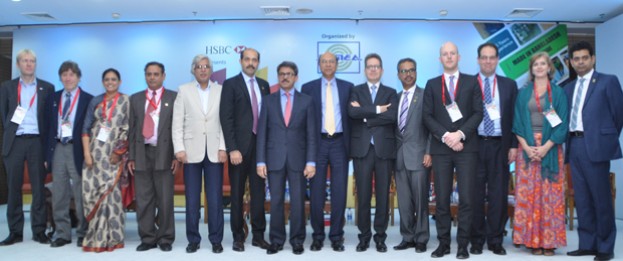


December 08, 2014
Reinventing the Apparel Model The Race to Responsible and Productivity Enhancement
(Dhaka,8 December 2014) Dhaka Apparel Summit, first of its kind in Bangladesh, is being at the Bangabandhu International Conference Center on 7-9 December. The summit was organized by Bangladesh Garment Manufacturers and Exporters Association (BGMEA) in collaboration with Brand Forum Bangladesh.
Press Release- Session 6
The 6th session of the Dhaka Apparel Summit titled “Reinventing the Apparel Model - The Race to Responsible Buying & Productivity Enhancement” was held at Bangabandhu International Conference Center (BICC) in Dhaka on 8 December.
This session focused on sustainability issues from the perspective of global value chain, accountability of the stakeholders across the value chain, and responsible entrepreneurship.
Opinions:
Richard P. Appelbaum, Professor, University of California at Santa Barbara, said that at the top of the supply chain there are buyers and retailers who place orders. Buyers should share responsibility with suppliers. Competing with cheap labor is not good thing for the industry in future. Bangladesh should opt for high-end products. The rights of labor declined at par with the decline of the prices of apparel in the US from 1989-210, according to his research on the apparel industry.
Nate Herman, Vice President, International Trade, American Apparel & Footwear Association (AAFA), said that the better understanding between suppliers and buyers is the ultimate key to sustainable industry.
Gunelie Winum, CEO, Sustainable Trade, Norway, said that one of the reasons of lower price is that the price is fixed on the basis of buyers’ target; it is not fixed based on the production cost. Buyers do not want to hear about production cost, they only convey their prices. Buyers do not bother or have knowledge about production cost. The suppliers lack capacity to convince buyers about the direct and indirect cost of labor.
Nazma Akter, General Secretary, AWAJ Foundation; President, Sommilito Garments Sromik Federation, Bangladesh, said that the vision has to be achieved with decent price. The multinational companies only want cheap labor, so the incident like Rana Plaza happens. The buyers should pay tax to the manufacturing country which will be spent on workers’ welfare.
Per N. Bondevik, Managing Director, Joint ETI (Ethical Trading Initiative) DIEH, said that the key to ensure responsible sourcing is transparency – transparency on production site, how brands are operated etc.
State Minister for Foreign Affairs Md. Shahriar Alam said that over the last 10 years the apparel prices have gone down by 10% in the US and by 25% in the EUduring the period Bangladesh’s apparel industry has grown.
Recommendations:
Richard P. Appelbaum, Professor, University of California at Santa Barbara, suggested binding legally enforceable agreement between brands and contract factories and renovating or retrofitting to make buildings safe.
Dr. Sharif As-Saber, Head of Geopolitics, Business and Government research cluster at RMIT University; Director, Master of International Business Program, School of Management, RMIT University, Melbourne, recommended global integrated coordinated solution. He also recommended a global secretariat with the representatives from buyers, suppliers and workers. The secretariat will act as a think tank and will come up with solutions to different problems of the industry. A ministry should be established for the RMG industry in Bangladesh.
Tyler Gillard, Head of Sector Projects, Responsible Business Conduct Unit, OECD, said that the suppliers have the responsibility to estimate the cost and communicate it properly to buyers. He recommended market access, improving productivity, and stop reputational damage.
Mayaudon Pierre, Ambassador/Head of Delegation, European Union Delegation to Bangladesh, said that giving a sense of belonging to the companies they work for, productivity can be enhanced. To make apparel model sustainable you just have to people first.
State Minister for Foreign Affairs Md. Shahriar Alam, said that the relationship between buyers and suppliers is crucial for responsible sourcing. He recommend one unified audit by all buyers instead several.
Dr. Toufiq Ali, Chief Executive, Bangladesh International Arbitration Centre (BIAC), moderated the session.
State Minister for Foreign Affairs Md. Shahriar Alam, Mayaudon Pierre, Ambassador/Head of Delegation, European Union Delegation to Bangladesh, Nate Herman, Vice President, International Trade, American Apparel & Footwear Association (AAFA), Richard P. Appelbaum, Professor, University of California at Santa Barbara, Dr. Sharif As-Saber, Head of Geopolitics, Business and Government research cluster at RMIT University; Director, Master of International Business Program, School of Management, RMIT University, Melbourne, Anwar Ul Alam Chowdhury (Parvez), Former President, BGMEA, Per N. Bondevik, Managing Director, Joint ETI (Ethical Trading Initiative) DIEH, Tyler Gillard, Head of Sector Projects, Responsible Business Conduct Unit, OECD, Gunelie Winum, CEO, Sustainable Trade, Norway, and Nazma Akter, General Secretary, AWAJ Foundation; President, Sommilito Garments Sromik Federation, Bangladesh, took part in the session as panel speakers.

Copyright © 2020, The Bangladesh Garment Manufacturers and Exporters Association.
Version-2.0, Design & Developed by Systech Digital Limited.
Version-2.0, Design & Developed by Systech Digital Limited.
